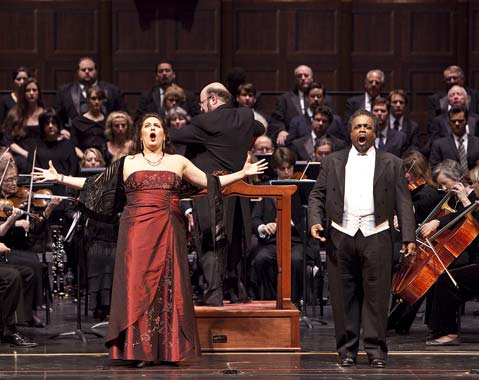Verdi’s Macbeth at the Granada
Opera Santa Barbara Presented the Classic Production Saturday

Opera Santa Barbara concluded its 2009-2010 season with a scaled-back concert version of Verdi’s Macbeth this past Saturday. After an initial twinge of disappointment at the lack of sets and costumes, one grew accustomed to the spare approach and began to see it more as an opportunity. Under these conditions it was possible to examine closely this extraordinary hybrid work that fuses the tragic sublimity of Shakespeare with the glorious exuberance of Verdi’s bel canto style. In the role of Macbeth, Mark Rucker was outstanding, delivering every note with energy and conviction. His entrances consistently ramped up the excitement, and his duets, particularly with Rosa D’Imperio as Lady Macbeth, were marvels of passionate interplay. Verdi famously said that he would rather have his Lady Macbeth be terrifying than beautiful, but D’Imperio managed to be both, bringing an awesome vocal technique to the demands of this role, which include some real fireworks, particularly in Act Four.
The rest of the cast, the chorus, and the orchestra were splendid, with Terry Cook (Banquo), Chad Berlinghieri (Malcolm), and Jeffrey Springer (Macduff) all contributing excellent solos. Springer in particular sang a brilliant and memorable aria, just one of the elements that made the second half of the evening so satisfying.
Verdi made some strange decisions, at least to the eyes and ears of an English-speaking audience well-versed in Shakespeare’s original text. Where Shakespeare placed the three witches in the center of things from the outset, Verdi chose instead to have them represented musically, as three-part harmonies for a larger female chorus. The music is magnificent, but the change alters the meaning irrevocably. What was once “weird” about the sisters becomes normal, at least insofar as anything in the operatic universe is ever ordinary. The Macbeths, so isolated and strange in relation to their social context in Shakespeare’s play, are oddly integrated through Verdi’s musical representation. For instance, when Lady Macbeth sings that her husband must follow the suggestion of the witches’ prophesy, she does so in ¾ time, transforming the sinister implications of her desire. Later, when the time comes for Macduff and Malcolm to dethrone Macbeth the usurper, Shakespeare’s emphasis on the main characters’ existential dread gives way to a more Italianate celebration of the will of the people to overcome their royal oppressor. It’s Macbeth by way of Garibaldi; it may not be Shakespeare, but it works.



